The Intel Kaby Lake-X i7 7740X and i5 7640X Review: The New Single-Threaded Champion, OC to 5GHz
by Ian Cutress on July 24, 2017 8:30 AM EST- Posted in
- CPUs
- Intel
- Kaby Lake
- X299
- Basin Falls
- Kaby Lake-X
- i7-7740X
- i5-7640X
Rocket League
Hilariously simple pick-up-and-play games are great fun. I'm a massive fan of the Katamari franchise for that reason — passing start on a controller and rolling around, picking up things to get bigger, is extremely simple. Until we get a PC version of Katamari that I can benchmark, we'll focus on Rocket League.
Rocket League combines the elements of pick-up-and-play, allowing users to jump into a game with other people (or bots) to play football with cars with zero rules. The title is built on Unreal Engine 3, which is somewhat old at this point, but it allows users to run the game on super-low-end systems while still taxing the big ones. Since the release in 2015, it has sold over 5 million copies and seems to be a fixture at LANs and game shows. Users who train get very serious, playing in teams and leagues with very few settings to configure, and everyone is on the same level. Rocket League is quickly becoming one of the favored titles for e-sports tournaments, especially when e-sports contests can be viewed directly from the game interface.
Based on these factors, plus the fact that it is an extremely fun title to load and play, we set out to find the best way to benchmark it. Unfortunately for the most part automatic benchmark modes for games are few and far between. Partly because of this, but also on the basis that it is built on the Unreal 3 engine, Rocket League does not have a benchmark mode. In this case, we have to develop a consistent run and record the frame rate.
Read our initial analysis on our Rocket League benchmark on low-end graphics here.
With Rocket League, there is no benchmark mode, so we have to perform a series of automated actions, similar to a racing game having a fixed number of laps. We take the following approach: Using Fraps to record the time taken to show each frame (and the overall frame rates), we use an automation tool to set up a consistent 4v4 bot match on easy, with the system applying a series of inputs throughout the run, such as switching camera angles and driving around.
It turns out that this method is nicely indicative of a real bot match, driving up walls, boosting and even putting in the odd assist, save and/or goal, as weird as that sounds for an automated set of commands. To maintain consistency, the commands we apply are not random but time-fixed, and we also keep the map the same (Aquadome, known to be a tough map for GPUs due to water/transparency) and the car customization constant. We start recording just after a match starts, and record for 4 minutes of game time (think 5 laps of a DIRT: Rally benchmark), with average frame rates, 99th percentile and frame times all provided.
The graphics settings for Rocket League come in four broad, generic settings: Low, Medium, High and High FXAA. There are advanced settings in place for shadows and details; however, for these tests, we keep to the generic settings. For both 1920x1080 and 4K resolutions, we test at the High preset with an unlimited frame cap.
For all our results, we show the average frame rate at 1080p first. Mouse over the other graphs underneath to see 99th percentile frame rates and 'Time Under' graphs, as well as results for other resolutions. All of our benchmark results can also be found in our benchmark engine, Bench.
MSI GTX 1080 Gaming 8G Performance
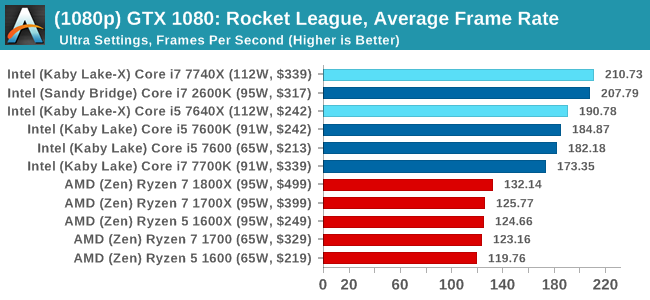
1080p

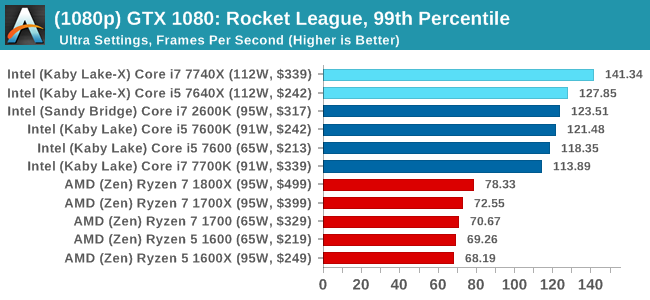
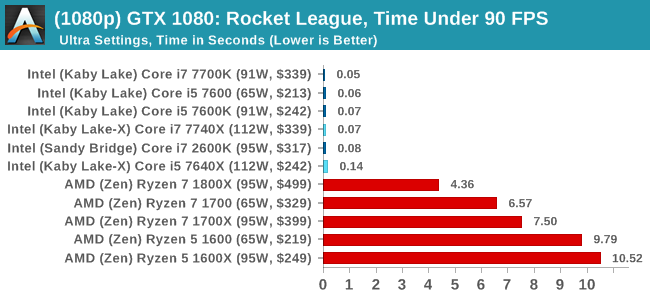
4K
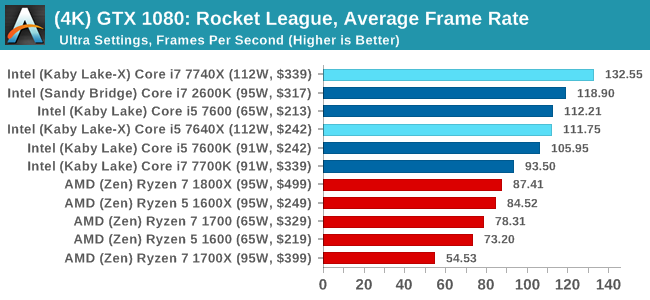
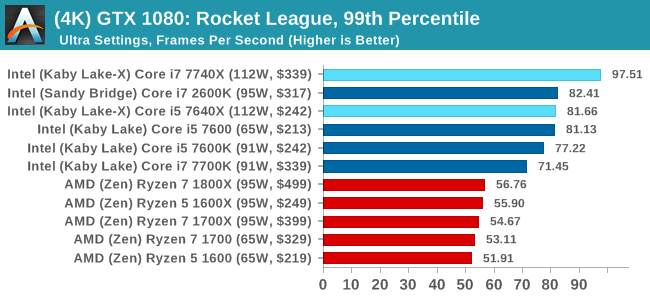
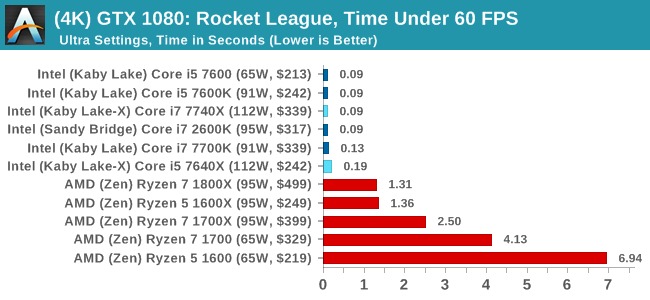
ASUS GTX 1060 Strix 6GB Performance
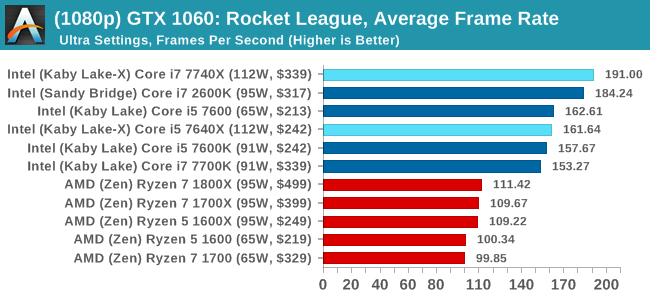
1080p

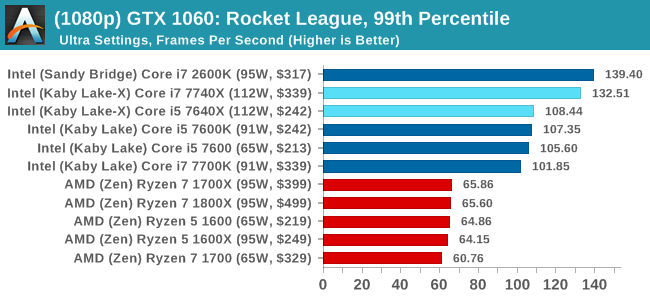
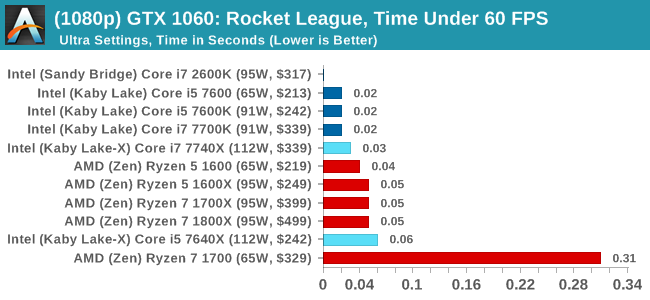
4K
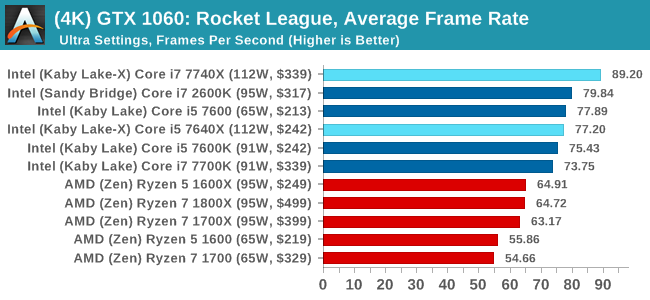
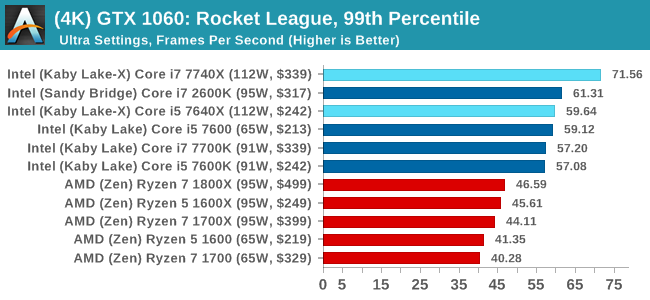
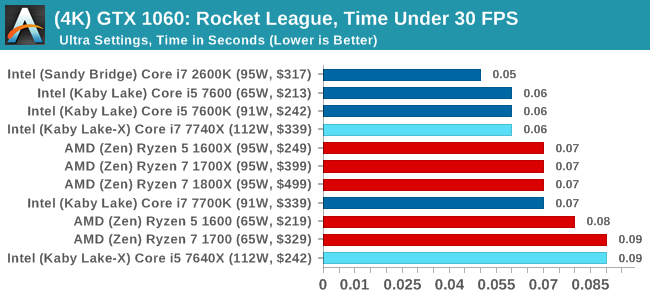
Sapphire R9 Fury 4GB Performance
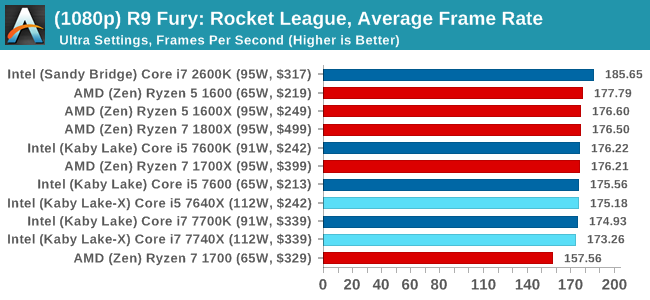
1080p

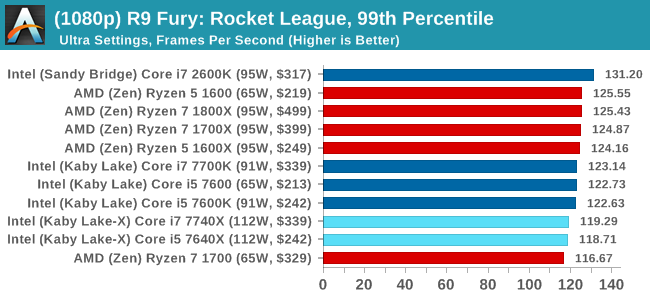
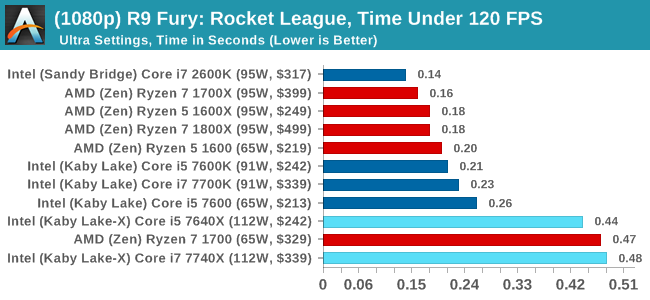
4K
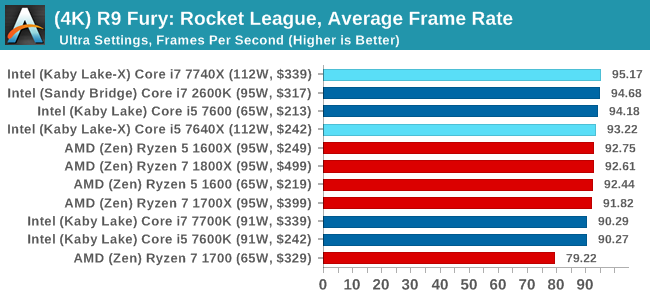
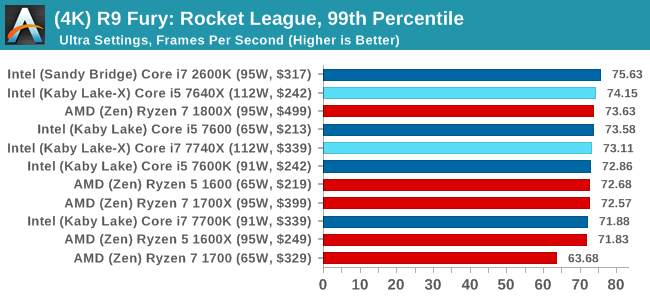
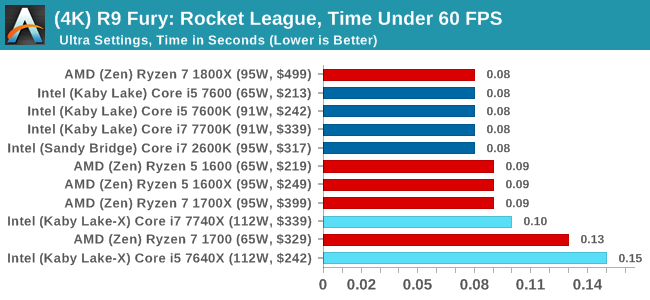
Sapphire RX 480 8GB Performance
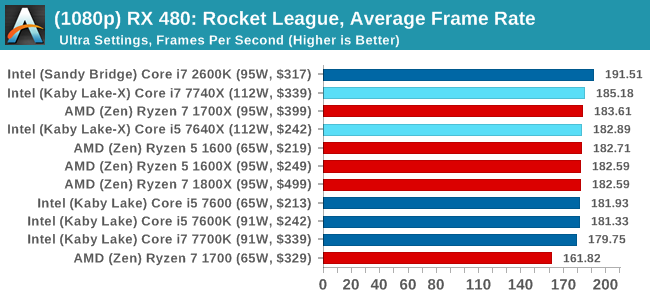
1080p

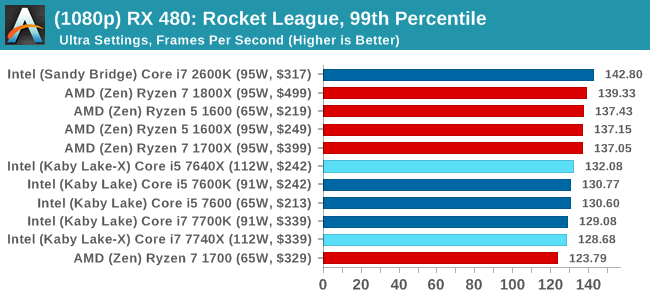
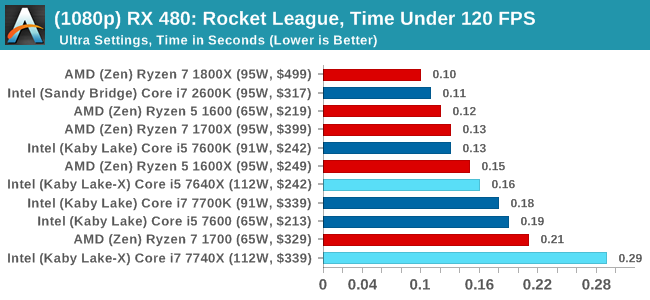
4K
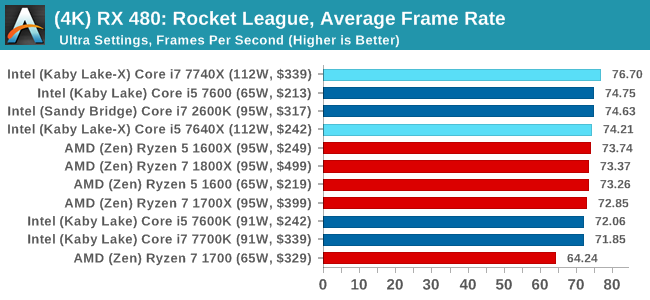
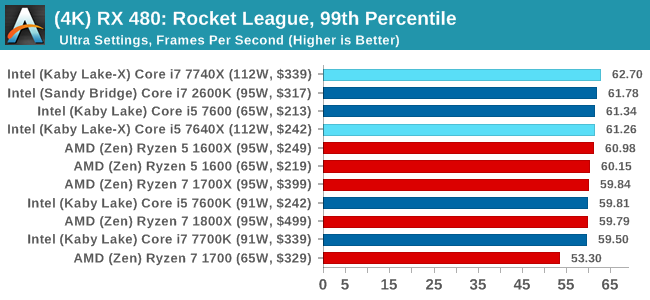
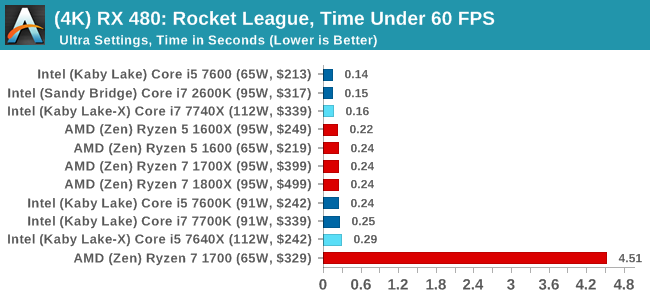
Rocket League Conclusions
The map we use in our testing, Aquadome, is known to be strenuous on a system, hence we see frame rates lower than what people expect for Rocket League - we're trying to cover the worst case scenario. But the results also show how AMD CPUs and NVIDIA GPUs do not seem to be playing ball with each other, which we've been told is likely related to drivers. The AMD GPUs work fine here regardless of resolution, and both AMD and Intel CPUs get in the mix.


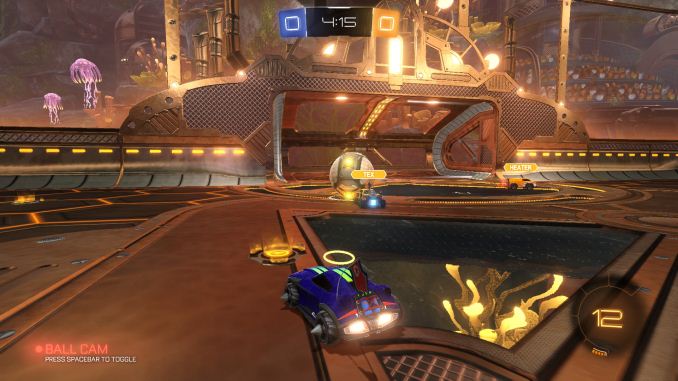
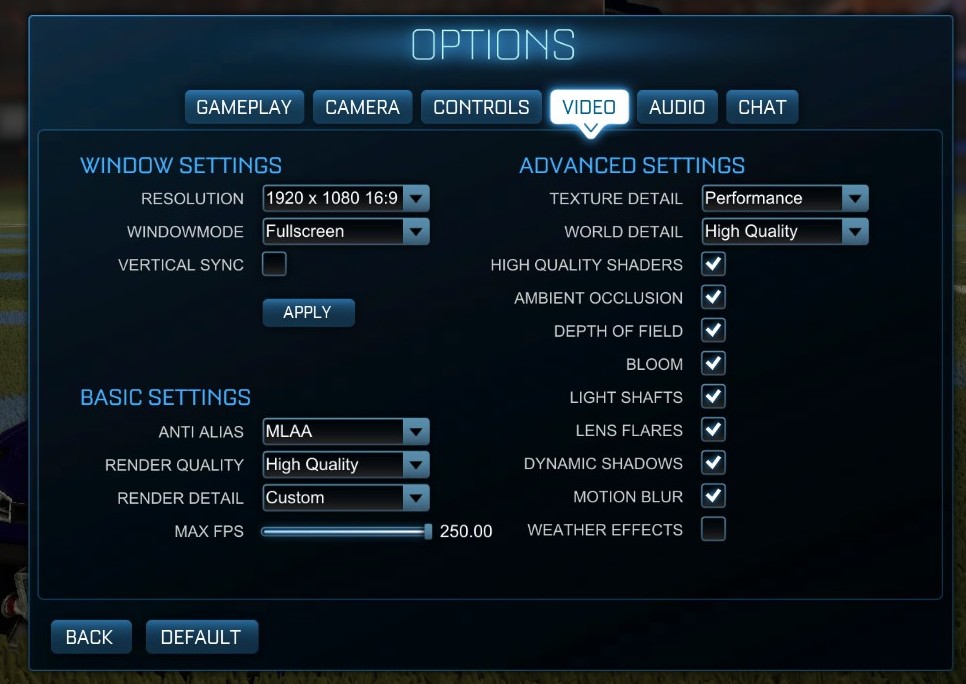








176 Comments
View All Comments
Ian Cutress - Monday, July 24, 2017 - link
*As specifically written down on that page and mentioned in the explanation for that benchmark*, GeoThermal Valley at 1080p on the GTX 1080 seems incredibly optimized: all the Core i5 chips do so much better than all the other chips.lixindiyi - Monday, July 24, 2017 - link
The frequency of Ryzen 7 1700 should be 3.0/3.7 GHz.Integr8d - Monday, July 24, 2017 - link
"After several years of iterative updates, slowly increasing core counts and increasing IPC, we have gotten used to being at least one generation of microarchitecture behind the mainstream consumer processor families. There are many reasons for this, including enterprise requirements for long support platforms as well as enterprise update cycles."You forgot 'milking their consumer, enthusiast and enterprise markets'...
Arbie - Monday, July 24, 2017 - link
Ian! You're a Brit - please help defend our common language. You meant to say "raises the question". "Begs the question" is totally different and does not even approximate what you intended.Journos: You don't have to understand "begs the question" because you'll very rarely need it. If you mean "raises the question" then just use that - plain English.
Mayank Singh - Monday, July 24, 2017 - link
Can someone explain how could the i5's could have got better performance than the i7 at 1080p?Ian Cutress - Monday, July 24, 2017 - link
Geothermal Valley on RoTR seems to be optimized for 1080p on a GTX 1080 and overly so, giving a lot more performance on that specific setup and test.Icehawk - Monday, July 24, 2017 - link
How is that possible? The i5 has slower clocks and less cache. So how can it be faster, "optimization" isn't valid here IMO unless I am missing something.I think you have a throttling issue or something else that needs to be examined. Monitoring long term clocks and temps is something that you need to look at incorporating if only to help validate results.
lucam - Monday, July 24, 2017 - link
When are you guys doing the iPad Pro review?dgz - Monday, July 24, 2017 - link
I remember a time when AT used to be a trustworthy. Who are you fulling, Ian? No one, that's who. Shame on you.Ian Cutress - Monday, July 24, 2017 - link
I've been called an AMD shill and an Intel shill in the space of two weeks. Fun, isn't it.